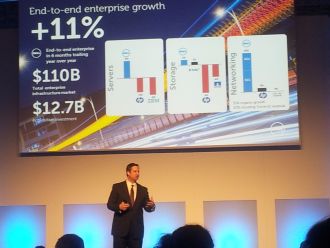 Dell CEO Michael Dell, so the rumours go, notoriously hates his company being referred to as a box-shifter.
Dell CEO Michael Dell, so the rumours go, notoriously hates his company being referred to as a box-shifter.
While speculation about him personally taking the company off the market to exert more control increases, European bigwigs here at Dell’s Technology Camp, Amsterdam, took to the stage promising a packed room of analysts and reporters that Dell is on an aggressive push into enterprise, but that it is very much established there already.
Dell believes it will find opportunity in a world plagued with recession, and heavy hitters such as Marius Haas, president for Dell Enterprise Solutions, are fighting the company’s corner.
Opening the presentation was Aongus Hegarty, president, Dell EMEA. He insisted that Dell’s position is as an established software company, and that its many recent acquisitions – recently herded into one umbrella group as Dell Software, are paying off. Recurring themes from all the speakers were the company’s broad intellectual property and a vast stockpile of patents, swelling with each acquisition.
Crucially, Aongus pointed out that Dell is unique to the competition. Showing a slide that presented the company in a very favourable light within the enterprise, his statement was backed up by HP veteran Marius Haas. Haas said that over the last 10 or so years, people have been mostly thinking about performance and value – but the trend has shifted onto how also to provide operational efficiency across the board.
Haas pointed out that systems can be expensive to maintain, and flagged the Itanium as an example. Although these systems can provide some operational efficiencies, costs are there because they don’t provide the full package, according to Haas. Even with cheaper Chinese vendors (naming no names), though capital costs may be at bargain prices, operational costs can be higher because there are other factors to think in – and they still must be maintained. This is where Dell differs, he said.
Scalability is another key point. Being able to deliver services from the SMBs to enterprise level means more opportunity and flexibility. Haas mentioned an initiative by the British government to store all data from every study in a digital format: this leads on to conversations from high computational requirements through to what is possible with tape storage, or the cheapest options to protect and keep that data.
Although there has been a slow down in business spending, Dell fully expects the second half of this year to pick up. We will have to wait and see. What is clear, is that Dell is serious about further entrenching its brand as an enterprise company and its execs were quite convincing. Can a further shift away from shaky consumer territory be on the cards?





